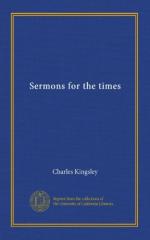But to return to Naboth. He loved his own land, and therefore he had a right to keep it. We may say it was but a fancy of his, if he could have a better vineyard, or the worth of it in money. Remember, at least, that God respected that fancy of his, and justified it, and avenged it. When (after Naboth’s death) Elijah accused Ahab, in God’s name, he put two counts into the indictment; for Ahab had committed two sins. ’Hast thou killed, and also taken possession?’ Killing was one sin; taking possession was another.
And so Ahab learnt two weighty and bitter lessons. He learnt that God’s Law stands for ever, though man’s law be broken or be forgotten by disuse. For you must understand, that these Jews were a free people, even as we are. They were not like the nations round about them, or as the Russians are now—slaves to their king, and holding their property only at his will. The law of Moses had made them a free people, who held their property each man from God, by God’s Law, which had said, ’Thou shalt not steal. Thou shalt not covet. Cursed is he who removes his neighbour’s landmark.’ And their kings were bound to govern by Moses’ law, just as our kings and rulers are bound to govern by the old constitutions of England, and to do equal justice by rich and poor. But the wicked kings of Israel were trying to break through that law, and make themselves tyrants and despots, such as the Czar of Russia is now. First, Jeroboam began by trying to wean his people from Moses’ law, by preventing their going up to worship at Jerusalem, and making them worship instead the golden calves at Dan and at Bethel. For he knew that if he could make idolaters of them, he should soon make slaves of them; and he succeeded; and the kingdom of Israel grew more miserable year by year; and now Ahab, his wicked successor, was breaking down the laws of property and wrongfully taking away his subjects’ lands. Perhaps he said in his heart, ’I am king; there is no law stronger than I. I have a right to do what I like.’ If he did so, he found that he was mistaken. He found that though he forgot Moses’ law, God had not; that the law stood there still, because it was founded on eternal justice, which proceeds for ever out of the mouth of God; and by the Law, which he had chosen to forget, he was judged; by the Law of God, which deals equal justice to rich and poor, which is, like God Himself, no acceptor of persons; but says, ‘Thou shalt not covet,’ to the king upon his throne as sternly as to the beggar on the dunghill.




